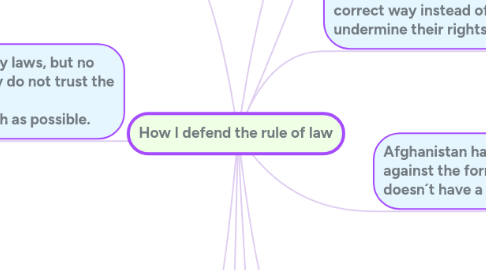How I defend the rule of law
by Jamilet Camacho


1. Jirga is a method of informal justice system in Afghanistan in which the leaders decided the best way to satisfy the debt.
1.1. If Jirgas are seen as mechanisms of control and coercion used by oppressive regimes WHY citizenz still do it?
1.2. If we find solutions for problems instead of using Jirgas we will significantly improve justice globally.
1.3. WHY are people continue making jirgas if at the end od the day they will not be happy with the results?
1.4. Jirga are based on old customs that had been there from generation to generation
2. Long-standing tribal custome play an important paper in the way people accept the law.
2.1. If Informal justice is impartial and free of improper influence why people use them???
2.2. According to UNICEF, there are over 280 million boys and girls who are married under the age of 15 because tribal custome think that is the best way of resolving a problem.
2.2.1. Child marriages prolong the vicious cycle of poverty, poor health, lack of education.
3. Afghanistan has many laws, but no implementation, they do not trust the judiciary, and avoid recourse to it as much as possible.
3.1. If citizens respected human rights, the illegal procedures like Jirga would disappear and we would be protecting ourselves.
3.2. Why aren´t human rights respected in poor people and in rural countries??
3.3. People who use these illegal procedures are conscious about laws and human rights, they just don´t have the desire to implement them.
4. Poor people and disadvantaged communities show ambivalence towards the formalinstitutions and put their trust into the informal institutions.
4.1. For example Naghma´s father has a debt of $2,500 with his neihbor, in order to satisfy the debt they decide to give Naghma who has 6 years old to the neighbor´s son who has 21.
4.2. Such as they contribute to perpetuating gross human rights abuses such as forced marriage and extrajudicial killing.
4.3. If Afghans are able to claim their rights, and duty bearers they will be able to meet their obligations.
4.4. If Afghanistan citizens are living in such hazardous conditions, the millions of world wide organizations and programs should be providing their services.
4.4.1. The United Nation System, The General Assembly, The Security Council, etc.
5. The lack of education and justness detracts citizens from exercising their rights
5.1. If we create a culture of transparency and accountability to the laws, we will achieve justness in order to make governments more accountable
5.2. Protecting our journalists and freedom of the press, makes governments more accountable to us and more transparent.
6. Afghanistan's informal justice system is lead by traditional or religious authorities, elders or other respected community members.
6.1. If we create a global human rights economy and all become global investors in human rights, the informal justice would disappear and justness will increase.
6.2. how can the engagement with informal justice systems can build greater respect and protection for human rights if it is a piece of shit???
6.3. How can we stop this system if it is control by the leaders who are supossed to be the one who protect the community??
7. Afghanistan has a deep-seated resentment against the formal system consequently it doesn´t have a genuine system of justice.
7.1. If there are no viable means of resolving societal disputes, the alternatives are either violence or conflict avoidance
7.2. For example Sahar was forced to get marriage and she was sold by her brother, also they forced her into prostitution and because she refused, she was tortured.
7.2.1. This is a clear example of VIOLENCE!!!
